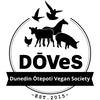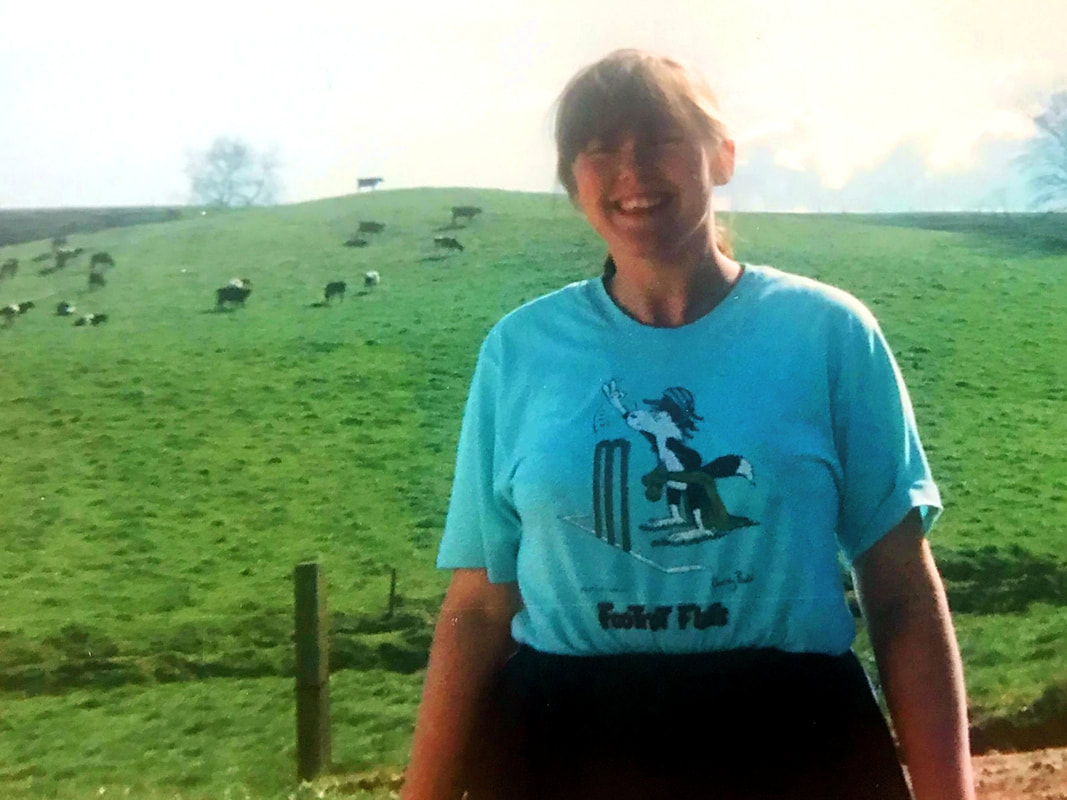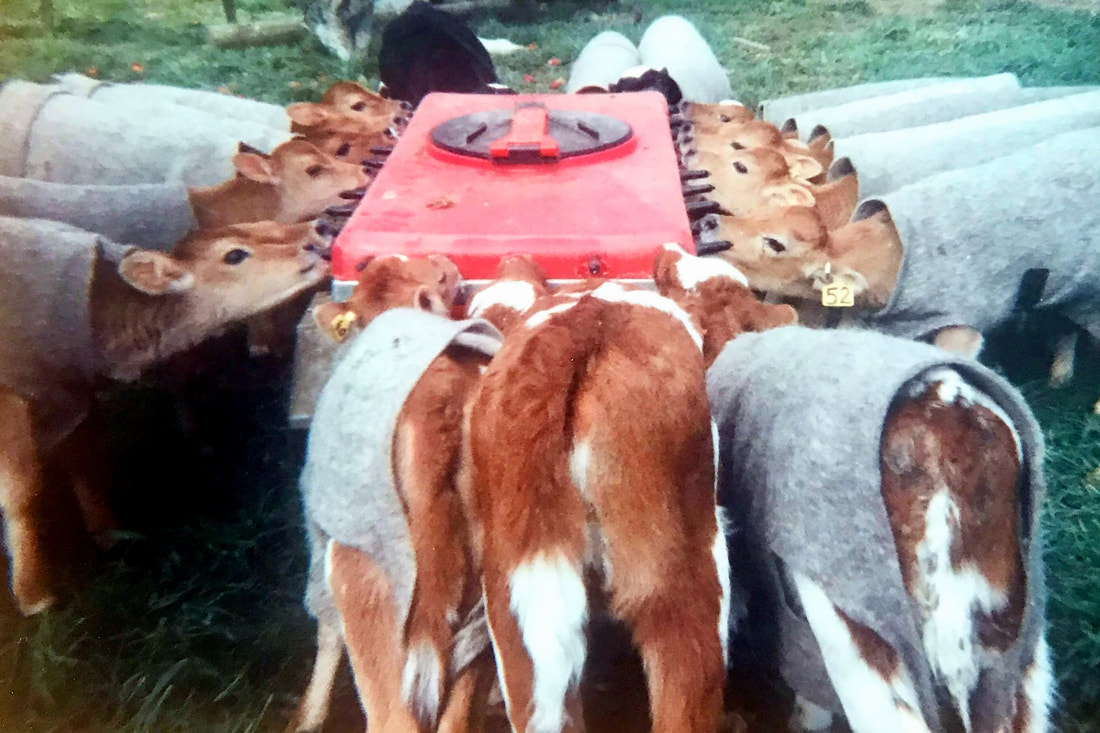|
Me when I was 20, getting ready for my first calving season as a contract milker. My Experiences as a Dairy Farmer When I arrived in NZ from England at age 19, one of the first things I learned to do was milk cows. My boyfriend at the time worked on a farm and had grown up on his parents' dairy farm. His grandparents had also been farmers. I liked the cows instantly, they were so docile and it was obvious what social and sensitive animals they were. There was a real hierarchy among the herd and they hated being apart from one another, which I found really touching. They were intelligent creatures too. It never occurred to me to wonder how on earth we as humans had come to dominate such a large animal. Every day the routine was the same. The farm was huge, meaning they had to walk for several hours each day just to get to and from the milking shed twice a day. I used to feel sorry for them, trudging along in the rain or in the searing heat, all for the sake of five minutes' spent in the milking shed. All through summer they would hopelessly swat away the hordes of flies in vain, with their stumpy little tails. Not that you could really call them tails; the glorious long swishing ones they had been born with had been cruelly removed as calves, using rubber bands which cut off the circulation and left the tails hanging for weeks until the flesh rotted and eventually dropped off. I didn't think that was fair at all, that they had to lose something so vital to their own comfort so that we humans didn't get whacked with it during milking, or – heaven forbid – it might get wet and dirty. I actually found milking time enjoyable though. I was always kind to the cows, chatting away to them and singing away as I went along. It never crossed my mind for a moment that milking the cows was cruel and that we were stealing milk that was intended solely for growing baby calves. Being allergic to dairy products since babyhood, I never touched milk myself. I was just doing what needed to be done, what had always been done. In fact NOT milking a cow for too long a period of time was considered cruel and extremely undesirable. After a while I was allowed to do the milking all by myself. You could always tell who was doing the milking by the behaviour of the cows. When it was me or my partner it was always uneventful. The atmosphere was relaxed and the cows were calm. However when our boss was in the shed things changed. He was a highly strung, angry man. Whenever he was around he was always yelling and hitting the cows, shouting at the dogs to bark and nip at their heels to make them go faster and pushing the yard gate behind them too tightly so that they were squashed up in a tiny space. Whenever he was milking the cows were always jittery and would lash out. Unfortunately this only made things worse and he would beat the hell out of them with a stick as they were trapped there defenceless in the bails. If he was really irate he would get the high pressure hose – like a fireman's hose - and force it into the cow's vagina, turning it on. I don't know how it occurred to him to ever do such a thing and it was so awful to watch I have never told another soul until now. I was only at that place for one year before I gratefully moved on to another farm, but 25 years later, that person is still milking cows today. My first experience I had with a calf was when I arrived at the cowshed at the end of milking one day to find a tiny Jersey calf sitting alone and shivering on the concrete. 'Ohhh, can I feed her?' I asked the owner of the farm. 'Nah, it's not worth anything, I'll hit it on the head after milking', he shrugged me off. I was horrified – for what good reason? Simple, she didn't have the right parentage or the right breeding to make him enough money. I persuaded him to let me buy her for $30 and took her home with me. He thought it was hilarious, but was forced to eat his words when he saw her in the garden eight weeks later. Shiny, strong and beautiful, he couldn't believe it was the same animal and wanted to buy her back from me. However I wasn't having that for a moment, and as soon as she was weaned I took her to my in-laws farm, where she lived until she was 10 years old and died of natural causes. With hundreds of cows of course I couldn't save every calf, but I did my very best to be a good foster mum with each spring that came around. I took enormous pride in my calves, I honestly did love them. I prided myself on being a good 'mum', never once thinking that I could never come close to replacing their real mum. Separating the cows from the calves tugged at my heart unbearably at times, not least because I had lost a baby of my own at just two days old. But despite my best reassurances, I don't think the poor distraught mothers understood that I really would look after them, as we grabbed their newborns and put them in a cage before driving them out of the paddock and into the shed as quickly as we could. It never occurred to me either that their babies – if they were 'lucky' enough to be girls at least, were resigned to the same fate as their mothers, that we were going to be robbing them of their milk and their babies for years to come. The fate of the 'bobbies' though – the calves who had the misfortune to be born male, or sired by a non-descript bull, that never felt right. Nobody cared about the bobbies, you couldn't get attached to them, because they never got to live more than a couple of days before the truck came to take them away to slaughter. All you could do was feed them twice a day like everyone else while they were there but I never got used to it. Three mornings a week I would be in tears to see the truck pull up at the roadside and take them away. If you were lucky you'd get a driver who would pick them up and lift them in properly but more often that not you'd see them just throw them in. By the time they'd got to you, the drivers had already lifted hundreds of calves and were just over it. As for the other bulls, they were the 'lucky ones' who got to live longer but of course there's no good outcome, it's all the same in the end. I was involved in both the beef and dairy farming industry in one way or another for almost 18 years in the end, before changing direction and moving to an urban location. I always prided myself in that we were kind to our animals and gave them a 'good' life. Now I know however that there is nothing kind about raising animals for their milk or meat. It doesn't matter how long they live, the outcome is the same for them all in the end. In the case of a dairy cow, they definitely have it the worst. They have to endure so much more for so much longer. When I think about it now, almost all the bovine illnesses we encountered when farming came about as a result of us humans pushing them too hard. Mastitis, milk fever, grass staggers, pinched nerves and paralysis, scours and bacterial infections in calves. They would all be preventable or non-existent if left to exist in their natural environment. Throughout my farming years I was vegetarian most of the time. I couldn't bring myself to eat an animal I 'knew' and I never drank a drop of the milk I took from the cows and sold. Even so, I never really considered how inhumane farming was until I went vegan last year. Originally I did so for health reasons, but the more I learned about the horrific and unnecessary treatment of animals, the more determined I was not to have any further part in contributing to the agricultural industry and the consumption of animal products. I ceased farming in 2010 and it feels like another lifetime to me now, like I'm a different person. I can't believe that I was even a part of it, let alone for so long. I can't believe that I couldn't see, that I thought what we were doing was OK. But like many farmers, it was a result of years, generations of conditioning and ingrained beliefs. The huge majority of farmers are not unkind, they're not monsters. They don't go out of their way to cause misery and suffering to their animals. They are just quite simply unaware. They honestly believe that they are doing the human race a valuable service, that their products are needed. Of course, a growing number of people are proving every day that they aren't. It is a scary and uncertain time for the farming industry, but an exciting one for animal-free products. I can't change my past, and I try not to think about it too much. It doesn't help to, because I can't undo any of it; but through sharing my inside knowledge and experience, I can at least help to change the future. This is of some of my first calves. I loved them. They all had names, full bellies, and warm coats.
But nothing I did for them could have replaced being with their mother. About the author: Jen is a freelance writer, fledgling activist, wife, and mother of adult children. She is an extreme minimalist and lives on the road permanently, with her husband and well-travelled and much-loved dog.
0 Comments
|
Archives
November 2021
Categories |



 RSS Feed
RSS Feed
